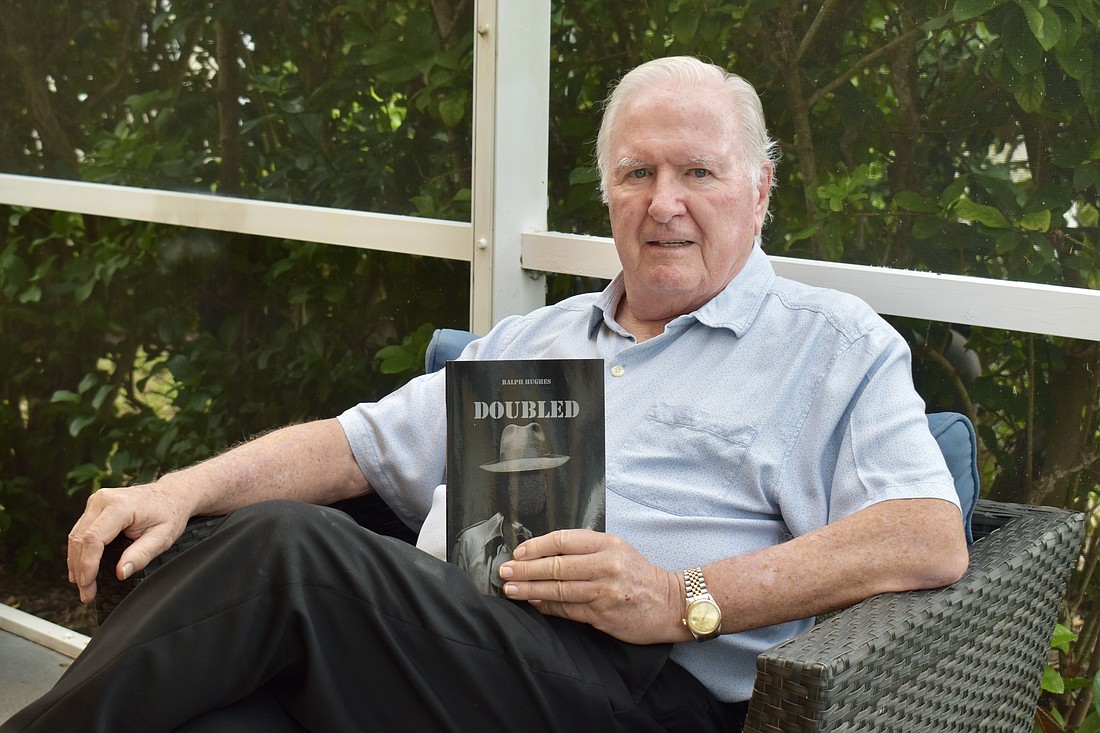- July 26, 2024
-
-
Loading

Loading

Ralph Hughes’ life versus his writing could be a case of the truth being stranger than fiction.
And it's going to have to stay that way, because, well, the truth is secret.
The Harbourside resident wrote two spy novels, and Central Intelligence Agency reviewers read both before they could go to print.
“I spent 27 years in the CIA as a Chief of Station in charge of all the Arab countries for a while, so I know a lot about CIA operations,” Hughes said. “Since I couldn’t tell my own stories because they’re classified, I decided to write fiction.”
Hughes began his adult life with a football scholarship to the University of Nebraska. But after only a year, he’d suffered shoulder and knee injuries. When told they’d take a few years to heal, he dropped out and took the exams for the military's Officer Candidate School.
“My company commander came to me and said, ‘Some civilians want to talk to you.’ To make a long story short, the next thing I knew, I was in the CIA on my way to Iran,” Hughes said. “I spent my entire military career as a civilian. As far as the Army was concerned, I was stationed in Arlington (Virginia), but I was really in Tehran (Iran).”
The long story is that Hughes spent three years in the military and then went back to Nebraska, not to play football, but to earn his degree as a certified public accountant and go on to law school. The goal was to become a tax attorney, but as CPA offers started rolling in, he was looking back at the CIA instead of forward to law school.
The first time around, things went so quickly, Hughes was taking a polygraph test with no idea why. The second time, he knew he was applying to the CIA, but had to wait on a six-month background check.
The CIA was interested in Hughes because his military testing revealed an innate language ability. Only an English speaker at the time, he went on to be fluent in Arabic, Turkish and French. Hughes studied Arabic at the Foreign Service Institute. Normally a two-year program, he finished in a little over a year.
While in Tehran, Hughes picked up Farsi with no formal training. He doesn’t claim to be fluent in Farsi, but he was able to learn the basics through conversation. He can also speak conversational Russian.

By the time Hughes moved into his home in the Longboat Key Club in 2005, he’d been retired from the CIA for 15 years. He started a company called Global Enterprises, which began as a political and security consulting firm but moved into equipment sales and eventually took on infrastructure projects in Turkey, Iraq, Egypt and Africa.
As with language, it had long been pointed out to Hughes that he had a talent for writing, but he never took an interest in honing the skill—not until a bad back took him off the golf course. With not much else to do, he wrote his first book “Doubled” in 2018. It was published in Oct. 2022, and he wrote a second in between that hasn’t been published yet.
“Doubled” took time. He’d write for a month and go blank for the next eight. But with the latest installment, Hughes was disciplined. He wrote four to five hours in his home office each day and had a final draft within three months.
The novels follow John Thorne, and like Hughes, he’s the commander of a foreign CIA station. Thorne is the thread, but Hughes says each book can stand on its own because of different plot lines and locations. He’s already got ideas for a third installment.
“A lot of people don’t realize that one of the main things that friendly countries have is a liaison between the CIA and the local intelligence service, which is the chief. One of his main jobs is to get intelligence from them and to give them intelligence,” Hughes said. “It is in our interest, many times, to keep local governments informed as to what’s going on in the area, not in their country, but in neighboring countries and in the world.”
Using the Russian invasion of Ukraine as a present-day example, he said the CIA is probably supplying the Ukrainians with intelligence daily. When Hughes was in charge of all Arab countries, Iran and Iraq were at war. He said it was a presidential decision to support Iraq and Saddam Hussein, not with weapons, but with intelligence so Iraq wouldn’t be overrun. And if not for the information they were given, Iraq most likely would have been overrun.
“I think that most spy novels are devoid of reality,” Hughes said, “And what I wanted to do was paint a picture of how a CIA station works and what the mindset is of a chief of station.”
With real life experience informing his imagination, readers can be assured that all plot lines are plausible. “Doubled” is available online at Amazon, Target and Barnes & Noble.
Correction: This article has been updated to correct the country Hughes was sent to while working in the CIA.